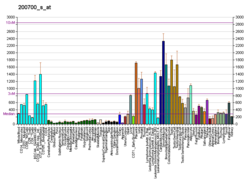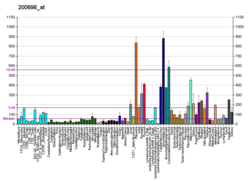From Wikipedia, the free encyclopedia
Protein-coding gene in the species Homo sapiens
ER lumen protein retaining receptor 2 is a protein that in humans is encoded by the KDELR2 gene .[ 5] [ 6] [ 7]
Retention of resident soluble proteins in the lumen of the endoplasmic reticulum (ER) is achieved in both yeast and animal cells by their continual retrieval from the cis-Golgi, or a pre-Golgi compartment. Sorting of these proteins is dependent on a C-terminal tetrapeptide signal, lys -asp -glu -leu (KDEL ) in animal cells and his -asp-glu-leu (HDEL ) in S. cerevisiae [ 7]
Implications in Disease [ edit ] Pathogenic variants in KDELR2 have been linked to Osteogenesis imperfecta .[ 8]
^ a b c GRCh38: Ensembl release 89: ENSG00000136240 – Ensembl , May 2017^ a b c GRCm38: Ensembl release 89: ENSMUSG00000079111 – Ensembl , May 2017^ "Human PubMed Reference:" . National Center for Biotechnology Information, U.S. National Library of Medicine .^ "Mouse PubMed Reference:" . National Center for Biotechnology Information, U.S. National Library of Medicine .^ Hsu VW, Shah N, Klausner RD (Jun 1992). "A brefeldin A-like phenotype is induced by the overexpression of a human ERD-2-like protein, ELP-1" . Cell . 69 (4): 625–35. doi :10.1016/0092-8674(92)90226-3 . PMC 7133352 PMID 1316805 . ^ Lewis MJ, Pelham HR (Oct 1992). "Sequence of a second human KDEL receptor". J Mol Biol . 226 (4): 913–6. doi :10.1016/0022-2836(92)91039-R . PMID 1325562 . ^ a b "Entrez Gene: KDELR2 KDEL (Lys-Asp-Glu-Leu) endoplasmic reticulum protein retention receptor 2" .^ Efthymiou, S; Herman, I; Rahman, F; Anwar, N; Maroofian, R; Yip, J; Mitani, T; Calame, DG; Hunter, JV; Sutton, VR; Yilmaz Gulec, E; Duan, R; Fatih, JM; Marafi, D; Pehlivan, D; Jhangiani, SN; Gibbs, RA; Posey, JE; SYNAPS Study, Group; Maqbool, S; Lupski, JR; Houlden, H (July 2021). "Two novel bi-allelic KDELR2 missense variants cause osteogenesis imperfecta with neurodevelopmental features" . American Journal of Medical Genetics. Part A . 185 (7): 2241–2249. doi :10.1002/ajmg.a.62221 . PMC 8436746 PMID 33964184 .
Pelham HR (1997). "The dynamic organisation of the secretory pathway" . Cell Struct. Funct . 21 (5): 413–9. doi :10.1247/csf.21.413 PMID 9118249 . Ewing RM, Chu P, Elisma F, et al. (2007). "Large-scale mapping of human protein–protein interactions by mass spectrometry" . Mol. Syst. Biol . 3 (1): 89. doi :10.1038/msb4100134 . PMC 1847948 PMID 17353931 . Kimura K, Wakamatsu A, Suzuki Y, et al. (2006). "Diversification of transcriptional modulation: Large-scale identification and characterization of putative alternative promoters of human genes" . Genome Res . 16 (1): 55–65. doi :10.1101/gr.4039406 . PMC 1356129 PMID 16344560 . Gerhard DS, Wagner L, Feingold EA, et al. (2004). "The Status, Quality, and Expansion of the NIH Full-Length cDNA Project: The Mammalian Gene Collection (MGC)" . Genome Res . 14 (10B): 2121–7. doi :10.1101/gr.2596504 . PMC 528928 PMID 15489334 . Ota T, Suzuki Y, Nishikawa T, et al. (2004). "Complete sequencing and characterization of 21,243 full-length human cDNAs" . Nat. Genet . 36 (1): 40–5. doi :10.1038/ng1285 PMID 14702039 . Hillier LW, Fulton RS, Fulton LA, et al. (2003). "The DNA sequence of human chromosome 7" . Nature . 424 (6945): 157–64. Bibcode :2003Natur.424..157H . doi :10.1038/nature01782 PMID 12853948 . Scherer SW, Cheung J, MacDonald JR, et al. (2003). "Human Chromosome 7: DNA Sequence and Biology" . Science . 300 (5620): 767–72. Bibcode :2003Sci...300..767S . doi :10.1126/science.1083423 . PMC 2882961 PMID 12690205 . Strausberg RL, Feingold EA, Grouse LH, et al. (2003). "Generation and initial analysis of more than 15,000 full-length human and mouse cDNA sequences" . Proc. Natl. Acad. Sci. U.S.A . 99 (26): 16899–903. Bibcode :2002PNAS...9916899M . doi :10.1073/pnas.242603899 PMC 139241 PMID 12477932 . van der Vlies D, Pap EH, Post JA, et al. (2002). "Endoplasmic reticulum resident proteins of normal human dermal fibroblasts are the major targets for oxidative stress induced by hydrogen peroxide" . Biochem. J . 366 (Pt 3): 825–30. doi :10.1042/BJ20020618 . PMC 1222834 PMID 12071860 . Xu XR, Huang J, Xu ZG, et al. (2002). "Insight into hepatocellular carcinogenesis at transcriptome level by comparing gene expression profiles of hepatocellular carcinoma with those of corresponding noncancerous liver" . Proc. Natl. Acad. Sci. U.S.A . 98 (26): 15089–94. Bibcode :2001PNAS...9815089X . doi :10.1073/pnas.241522398 PMC 64988 PMID 11752456 .







